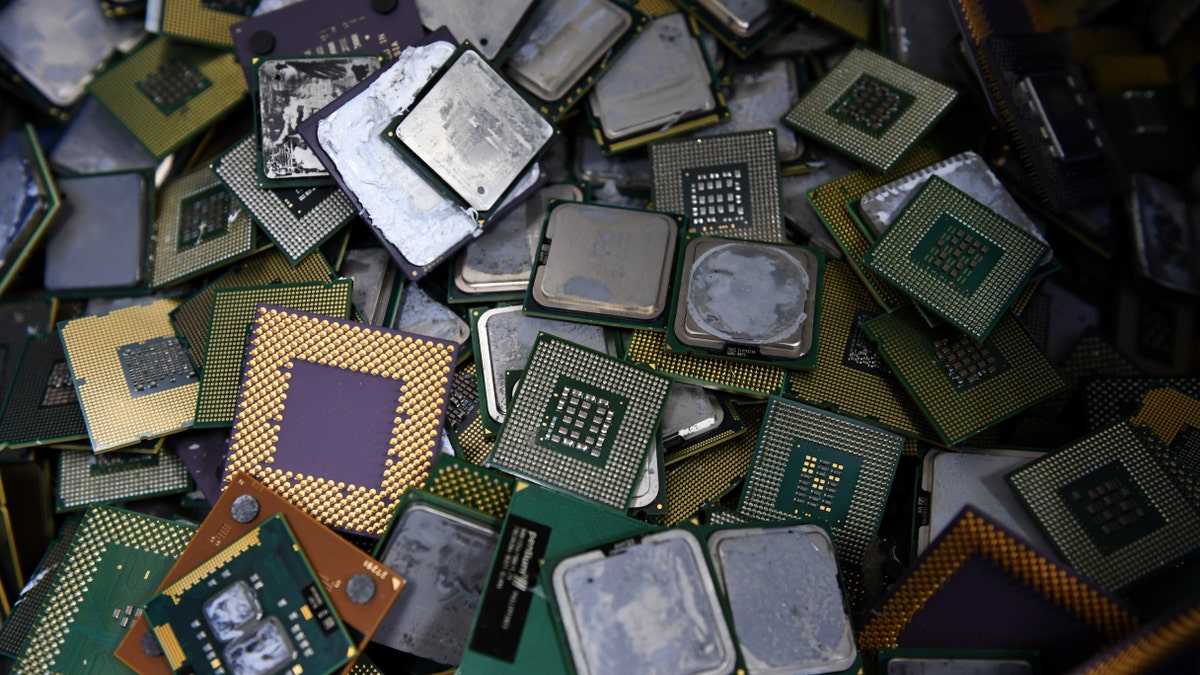Fox News Flash top headlines for Nov. 29
Fox News Flash top headlines for Nov. 29 are here. Check out what's clicking on Foxnews.com
The pileup of electronic waste will only accelerate with consumers buying more and more devices.
A whopping 52 percent of 16- to 24-year-olds in the U.K. have 10 or more gadgets in their home, according to a survey by the Royal Society of Chemistry.
Thirty-nine percent of 35- to 44-year-olds have 10 or more devices, and 30 percent of people aged between 55 and 75.
APPLE’S SECRET LAB WHERE ROBOTS PULL APART IPHONES TO INVENT ‘FUTURE OF RECYCLING’ REVEALED
That’s a problem when 82 percent of those households have no plans to recycle or sell their devices after they stop using them, the society noted.

This photo taken on January 19, 2017 shows removed computer CPUs (central processing units) at the Tokyo Eco Recycle company in Tokyo - file photo. (TOSHIFUMI KITAMURA/AFP via Getty Images)
Other key results from the survey:
- 51 percent of households have at least one unused electronic device at home
- 45 percent have between two and five
- 25 percent have an unused laptop
- 23 percent have an unused mobile phone
Waste pileup + conflict elements = opportunity
Each year, approximately 50 million tons of electronic and electrical waste (e-waste) is produced, “equivalent in weight to all commercial aircraft ever built,” according to a report from World Economic Forum (WEF) — yet only 20 percent is recycled. At that rate, the amount of waste will more than double by 2050, to 120 million tons annually.
Besides the raw waste, mobile devices contain “conflict elements” like gold, toxic elements such as arsenic and rare elements like indium, the Royal Society of Chemistry said. “Natural sources of six of the elements found in mobile phones are set to run out within the next 100 years,” it added.
But e-waste is an opportunity, according to the WEF, which values the “waste” material at $62.5 billion, more than three times the annual output of the world’s silver mines and more than the gross domestic product of most countries.
AIR FORCE TESTS PLASMA REACTOR TO DESTROY 'FOREVER CHEMICALS' IN CONTAMINATED GROUNDWATER
“There is 100 times more gold in a ton of mobile phones than in a ton of gold ore,” the WEF said.
And harvesting the material from used electronics produces substantially less carbon-dioxide emissions than mining the Earth’s crust, the organization said.
CLICK HERE TO GET THE FOX NEWS APP
That means there is an economic opportunity to build a more circular electronics system. “One in which resources are not extracted, used and wasted," the WEF said. "But valued and reused in ways that create decent, sustainable jobs. In short, we need a new vision for electronics.”









































